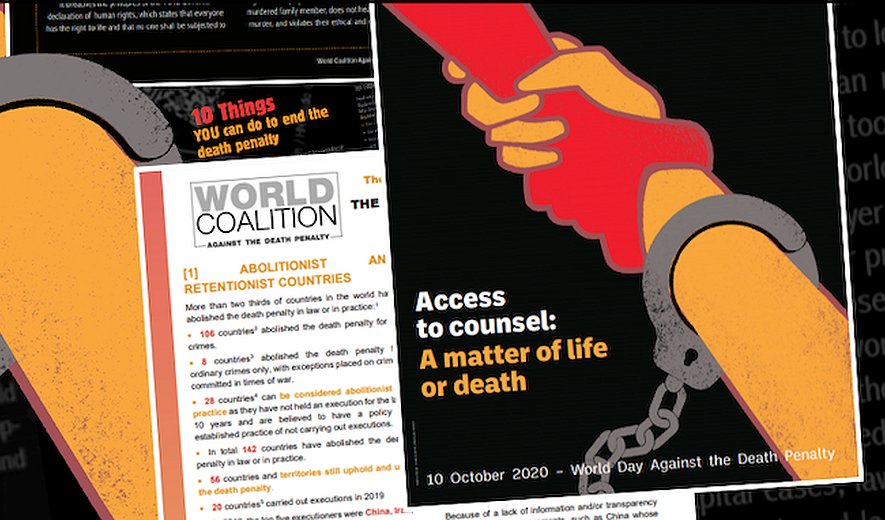October 10: World Day Against the Death Penalty

Iran Human Rights (IHR); October 7, 2020: 10th October 2020 marks the eighteenth year that this day was set as the World Day Against the Death Penalty. Each year, the World Coalition Against the Death Penalty focuses on a particular issue surrounding the death penalty, the individuals executed and those awaiting execution. The issue being highlighted this year is the right to access legal counsel for individuals who are at risk of execution.
As a member of the Steering Committee of the World Coalition Against the Death Penalty, on this World Day Against the Death Penalty, Iran Human Rights is drawing the attention of the public, activists and human rights organisations around the world to the issue of due process violations in the vast majority of cases which end up with death sentences in the Islamic Republic of Iran.
IHR Director, Mahmood Amiry-Moghaddam said: “Most of the individuals who are sentenced to death by the Islamic Republic are denied due process and access to a lawyer of their choice. On World Day Against the Death Penalty, we hope that people and the growing abolitionist movement in Iran, will join forces with anti-death penalty activists around the world to voice their opposition to this inhumane punishment.”
History of World Day Against the Death Penalty
In 2003, under the umbrella of the World Coalition Against the Death Penalty, dozens of human rights organisations around the world designated October 10 as the World Day Against the Death Penalty. Iran Human Rights has been a member of the coalition since 2009 and a member of its steering committee since 2011.
In 2007, the Council of Europe and the European Union officially recognised October 10 as the World Day Against the Death Penalty.
The Islamic Republic of Iran has consistently been on the list of countries that carry out the highest number of executions
Internationally, 106 countries have abolished the death penalty for all crimes. 8 countries have abolished it for ordinary crimes only but use it for specific crimes such as genocide. 28 countries have not legally abolished the death penalty but are abolitionists in practice.
But 56 countries are retentionists. In 2019, the 5 countries that carried out the most executions were: China, Iran, Saudi Arabia, Iraq and Egypt. After China, in the past decades the Islamic Republic of Iran has carried out the highest number of executions in the world.
Annually, Iran Human Rights publishes a statistical and analytical report on executions in Iran. According to the 2019 report, at least 280 people were executed in Iran, including at least 4 juvenile offenders. 13 people were also publicly hanged in 2019. The Islamic Republic of Iran is one of the last countries to still carry out death sentences on juvenile offenders and to carry out public executions.
The right of access to a lawyer
As aforementioned, the issue being highlighted this year is the right to access legal counsel. This is of particular importance for Iran as the recognised standards of a fair trial are not observed in almost any of the cases leading to the death penalty. Forcing confessions under torture is one of the key tools used by interrogators which in many cases are then used as evidence for sentencing.
The defence lawyers are denied access to their clients in the early stages of the interrogations and only gain access to the case file once the interrogations under pressure and torture are over. In many cases, defendants are denied access to a lawyer of their choice.
A note to Article 48 of the Islamic Penal Code severely restricts access to a lawyer for certain crimes, which many law experts consider to be unconstitutional in the Islamic Republic. The note to Article 48 deprives the defendant of their right to access a lawyer during the preliminary investigations and then, they “may choose a lawyer/lawyers from the list confirmed by the head of the judicial system.”

